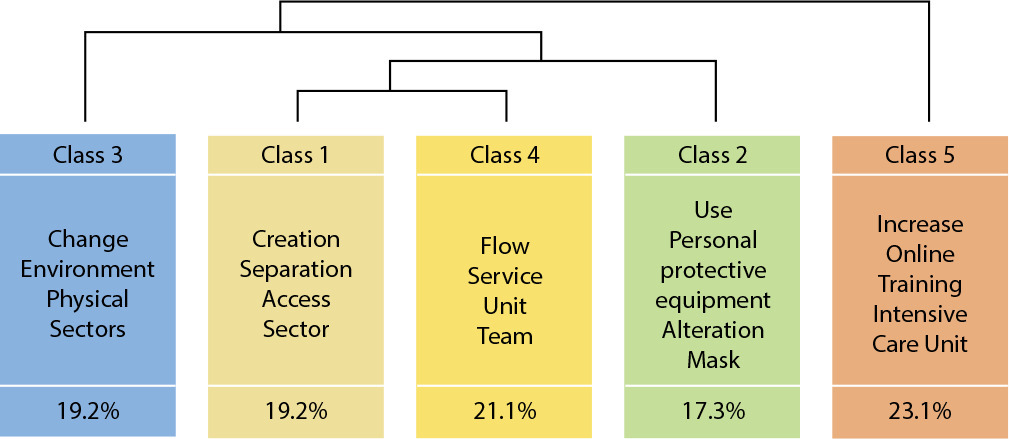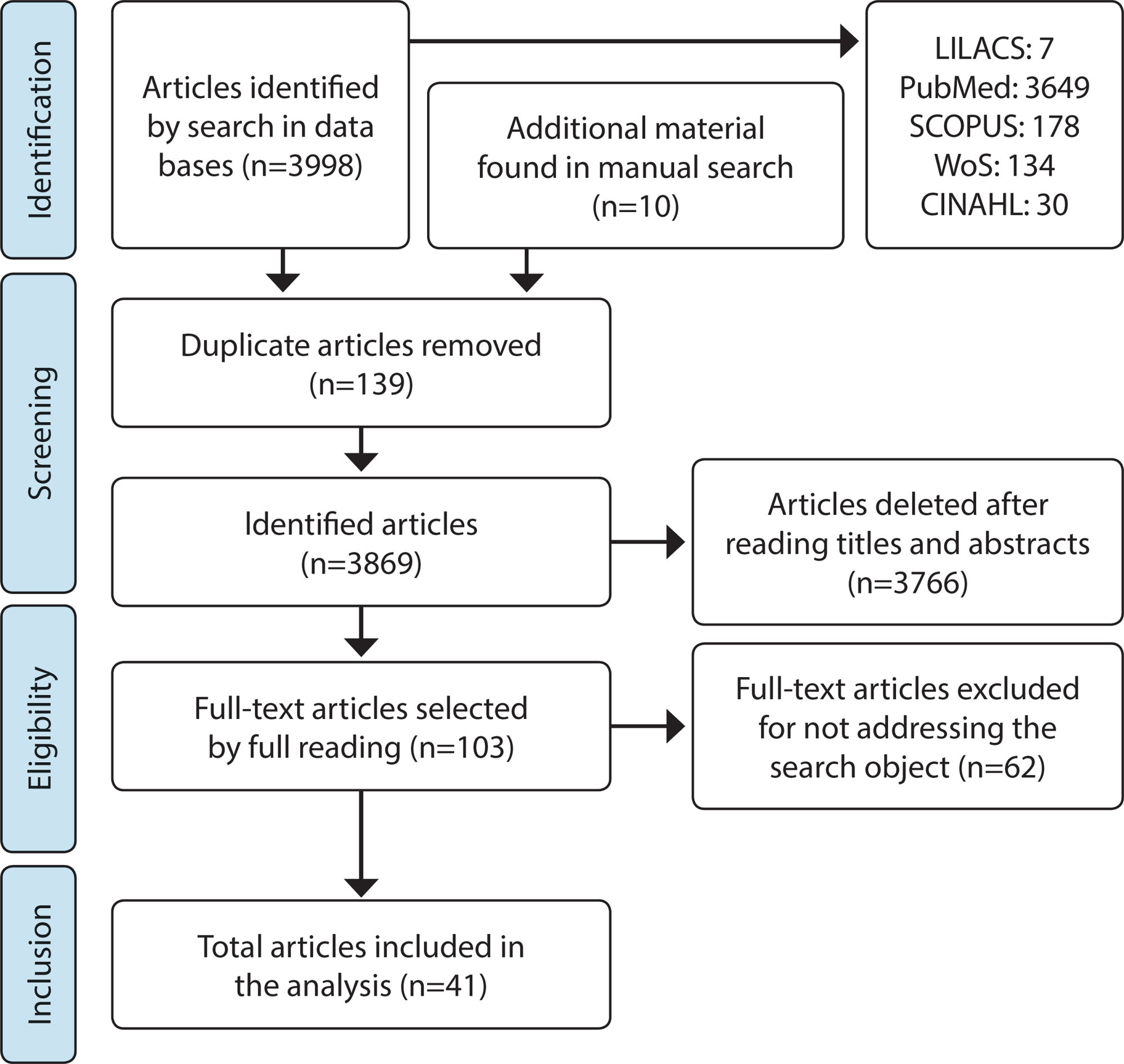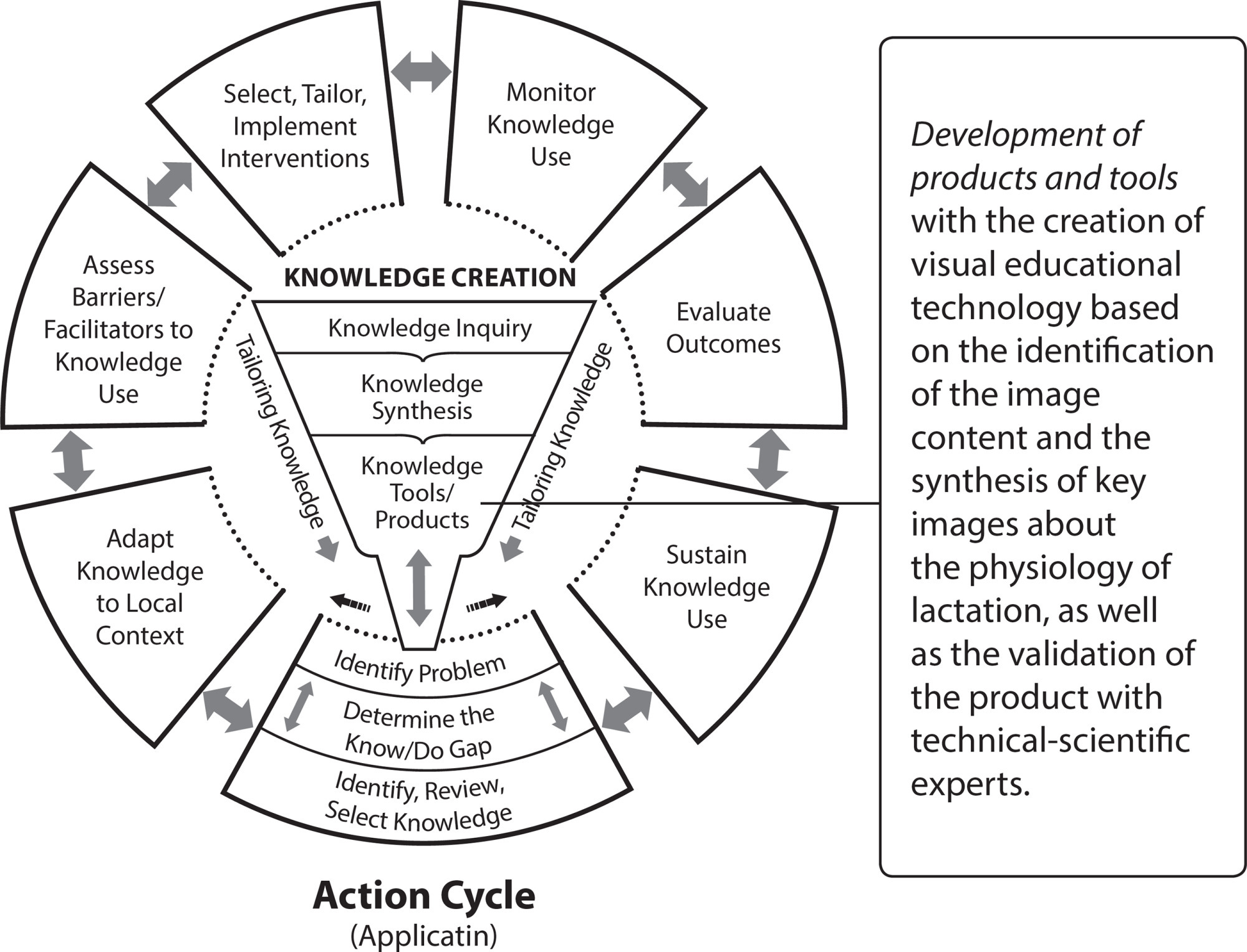-
ORIGINAL ARTICLE10-09-2023
Independent and combined effects of lifestyle behaviors on adolescent health-related quality of life
Revista Brasileira de Enfermagem. 2023;76(4):e20220780
Abstract
ORIGINAL ARTICLEIndependent and combined effects of lifestyle behaviors on adolescent health-related quality of life
Revista Brasileira de Enfermagem. 2023;76(4):e20220780
DOI 10.1590/0034-7167-2022-0780
Views0See moreABSTRACT
Objective:
To investigate the independent and combined effects of lifestyle behaviors, including physical activity, sedentary behavior, sleep duration and food intake, in the health-related quality of life (HRQoL) of Brazilian adolescents.
Methods:
Cross-sectional school-based study, with the participation of 306 adolescents aged 14 to 18 years. A questionnaire was applied with structured questions to collect lifestyle behaviors data. Perception of the HRQoL was identified using the Kidscreen-27. The study used covariance analysis and linear regression models for statistical analysis.
Results:
Adolescents who reported ≤ 2 hours/day of screen-based sedentary behavior and sleep duration equivalent to 8-10 hours/night presented significantly higher HRQoL. Adolescents who reported joint adherence ≥ 3 healthy lifestyle behaviors demonstrated approximately two [OR=2.12] to three times [OR=3.04] more chance of presenting higher perceptions of HRQoL.
Conclusion:
Although healthy lifestyle behaviors had a positive independent effect on HRQoL, joint adherence to healthy behaviors enhances the cumulative effect.

-
ORIGINAL ARTICLE10-09-2023
Health care for people with tuberculosis/HIV co-infection from the multidisciplinary team’s perspective
Revista Brasileira de Enfermagem. 2023;76(4):e20220733
Abstract
ORIGINAL ARTICLEHealth care for people with tuberculosis/HIV co-infection from the multidisciplinary team’s perspective
Revista Brasileira de Enfermagem. 2023;76(4):e20220733
DOI 10.1590/0034-7167-2022-0733
Views0See moreABSTRACT
Objective:
to know the multidisciplinary team’s perspective about the health care of people with tuberculosis and human immunodeficiency virus co-infection in relation to treatment.
Methods:
this is a descriptive-exploratory study, with a qualitative approach, carried out in a health care service in São Paulo, from May to June 2019. Semi-structured interviews were conducted with nine professionals from the multidisciplinary team. Data were processed through discourse analysis with the support of webQDA.
Results:
Two empirical categories emerged: Health care interfaces for people with tuberculosis and human immunodeficiency virus co-infection; Barriers and facilitators for health care for people with co-infection.
Final considerations:
the health-disease process in co-infection is mediated by conditions that positively or negatively interfere with treatment compliance. People’s health care goes beyond exclusively clinical assistance and requires the recognition of needs in a broad perspective.

-
ORIGINAL ARTICLE10-09-2023
Translation and validity of the Multidimensional Individual and Interpersonal Resilience Measure
Revista Brasileira de Enfermagem. 2023;76(4):e20220696
Abstract
ORIGINAL ARTICLETranslation and validity of the Multidimensional Individual and Interpersonal Resilience Measure
Revista Brasileira de Enfermagem. 2023;76(4):e20220696
DOI 10.1590/0034-7167-2022-0696
Views0See moreABSTRACT
Objective:
to translate, culturally adapt and validate the Multidimensional Individual and Interpersonal Resilience Measure to Brazilian Portuguese.
Method:
after initial translation, the pre-final version underwent rigorous cultural adaptation procedures. As a result, the final adapted version was submitted to a validity study.
Results:
adaptation procedures provided equivalence between the pre-final and the original versions in semantic, idiomatic, experiential and conceptual terms. A total of 187 older adults were included in the validity study. Exploratory factorial analysis (EFA) generated a model of five factors ((RMSEA = 0.030; TLI = 0.959; X = 151.590 p> 0.05). Final version showed adequate consistency (Cronbach’s α = 0.705) and test-retest reliability (ICC=0.835). No statistically significant correlation was found between resilience and sociodemographic and epidemiological variables assessed in this study.
Conclusion:
EMRII-BR is a valid and reliable instrument for measuring resilience in Brazilian older adults.
-
10-09-2023
Standard Operating Procedure validity on intramuscular vaccine administration in adults: a methodological study
Revista Brasileira de Enfermagem. 2023;76(4):e20220692
Abstract
Standard Operating Procedure validity on intramuscular vaccine administration in adults: a methodological study
Revista Brasileira de Enfermagem. 2023;76(4):e20220692
DOI 10.1590/0034-7167-2022-0692
Views0See moreABSTRACT
Objective:
to validate a Standard Operating Procedure on the intramuscular vaccine administration technique in adults using high frequency vibration associated with cryotherapy.
Methods:
a literature review on intramuscular vaccination practice using a vibration device associated with cryotherapy. Then, a form was created to validate the instrument, detailing the items that were assessed by judges following recommendations in the literature. Judges’ answers were assessed using the Content Validity Index, with items whose index was greater than or equal to 0.80 being validated.
Results:
twenty-five nurses participated in validity, identifying judges’ opinion regarding item relevance, clarity and accuracy. Judges validated the instrument, according to the values that remained between 0.88 and 1.0.
Conclusions:
the instrument developed and validated is a tool capable of guaranteeing safety and standardizing immunization practice in vaccine rooms.
-
ORIGINAL ARTICLE10-09-2023
Clinical supervision strategies, learning, and critical thinking of nursing students
Revista Brasileira de Enfermagem. 2023;76(4):e20220691
Abstract
ORIGINAL ARTICLEClinical supervision strategies, learning, and critical thinking of nursing students
Revista Brasileira de Enfermagem. 2023;76(4):e20220691
DOI 10.1590/0034-7167-2022-0691
Views0See moreABSTRACT
Objective:
To identify the supervisory strategies that Nursing students consider facilitators of the development of critical thinking skills in clinical teaching.
Methods:
This is a qualitative study, within the interpretative paradigm, using the focus group methodology. Eight undergraduate nursing students participated in the study.
Results:
Participants recognized the indispensability of critical thinking for professional responsibility and quality of care and highlighted the importance of using supervisory strategies adapted to their needs, learning objectives, and the context of clinical practice.
Final considerations:
This study highlights the urgent need to establish, within the Nursing curricula, clinical supervision strategies that promote critical thinking and favor the development of skills for good clinical judgment, problem solving, and safe, effective, and ethical decision-making.
-
EXPERIENCE REPORT10-09-2023
Focus group in the development of concepts for a Nursing model: experience report
Revista Brasileira de Enfermagem. 2023;76(4):e20220689
Abstract
EXPERIENCE REPORTFocus group in the development of concepts for a Nursing model: experience report
Revista Brasileira de Enfermagem. 2023;76(4):e20220689
DOI 10.1590/0034-7167-2022-0689
Views0See moreABSTRACT
Objective:
To communicate the experience of developing concepts for the construction of a care model through focus groups.
Methods:
An experience report on the development of concepts through remote focus groups with members of a research group from a public university in southern Brazil.
Results:
Focus groups were developed in which homogeneity and heterogeneity criteria were observed among participants. In addition to the concepts of the nursing metaparadigm, the concepts of care and family-centered care were developed, relevant to the nursing care model in question.
Final considerations:
Despite the challenges of conducting remote focus groups, they were suitable for the collective construction of concepts for a nursing care model, allowing the interaction of participants from different locations.
-
10-09-2023
Autocompaixão entre estudantes de enfermagem de uma Universidade Estadual da Indonésia durante a pandemia de COVID-19
Revista Brasileira de Enfermagem. 2023;76(4):e20220585
Abstract
Autocompaixão entre estudantes de enfermagem de uma Universidade Estadual da Indonésia durante a pandemia de COVID-19
Revista Brasileira de Enfermagem. 2023;76(4):e20220585
DOI 10.1590/0034-7167-2022-0585
Views0See moreRESUMEN
Objetivo:
Determinar el nivel de autocompasión e investigar las relaciones entre las variables sociodemográficas y la autocompasión entre estudiantes de pregrado de enfermería en una universidad estatal de Indonesia durante la pandemia de COVID-19
Métodos:
Este estudio utilizó un diseño transversal. Las muestras se seleccionaron mediante una técnica de muestreo aleatorio estratificado proporcional (n=260). Los datos se recopilaron utilizando una versión indonesia de la Escala de Autocompasión, que consta de 6 subescalas: bondad propia, autocrítica, humanidad común, aislamiento, atención plena y sobre identificación. Los datos se analizaron mediante análisis univariado y bivariado.
Resultados:
El 60% de los estudiantes tenían autocompasión moderada. Los estudiantes puntuaron más alto en amabilidad consigo mismos (3,93±1,02) y sobre identificación (3,58±0,94), lo que indica que a menudo intentaban amarse a sí mismos cuando sentían dolor emocional y a menudo se dejaban llevar cuando sucedió algo perturbador. Posteriormente, se encontró una correlación significativa entre la edad y la autocompasión (p<0,05).
Conclusión:
La autocompasión entre los estudiantes de enfermería debe mejorarse por medio de intervenciones como la alfabetización de la compasión, el entrenamiento en atención plena y las técnicas experienciales basadas en la compasión.
-
10-09-2023
Tradução e validação do Multidimensional Individual and Interpersonal Resilience Measure
Revista Brasileira de Enfermagem. 2023;76(4):e20220696
Abstract
Tradução e validação do Multidimensional Individual and Interpersonal Resilience Measure
Revista Brasileira de Enfermagem. 2023;76(4):e20220696
DOI 10.1590/0034-7167-2022-0696
Views0See moreRESUMEN
Objetivo:
traducir, adaptar culturalmente y validar el Multidimensional Individual and Interpersonal Resilience Measure para el portugués brasileño.
Método:
después de la traducción inicial, la versión pre-final pasó por rigurosos procedimientos de adaptación cultural. Como resultado, la versión final adaptada fue sometida a un estudio de validez.
Resultados:
los procedimientos de adaptación proporcionaron equivalencia entre las versiones pre-final y original en términos semánticos, idiomáticos, experienciales y conceptuales. Un total de 187 ancianos fueron incluidos en el estudio de validez. El análisis factorial exploratorio (AFE) generó un modelo de cinco factores ((RMSEA = 0,030; TLI = 0,959; X = 151,590 p> 0,05). La versión final mostró adecuada consistencia (α de Cronbach = 0,705) y confiabilidad prueba-reprueba (ICC=0,835). No se encontró correlación estadísticamente significativa entre la resiliencia y las variables sociodemográficas y epidemiológicas evaluadas en este estudio.
Conclusión:
EMRII-BR es un instrumento válido y confiable para medir la resiliencia en ancianos brasileños.
-
ORIGINAL ARTICLE11-29-2022
Changes implemented in the work environment of nurses in the COVID-19 pandemic
Revista Brasileira de Enfermagem. 2022;75:e20201381
Abstract
ORIGINAL ARTICLEChanges implemented in the work environment of nurses in the COVID-19 pandemic
Revista Brasileira de Enfermagem. 2022;75:e20201381
DOI 10.1590/0034-7167-2020-1381
Views0See moreABSTRACT
Objective:
to describe the changes implemented in the work environment of nurses in university hospitals considering the COVID-19 pandemic.
Methods:
this qualitative and descriptive research was developed from an online survey with 75 nurses from three Brazilian university hospitals. Data processing occurred through textual analysis with the aid of software IRAMUTEQ.
Results:
five semantic classes were obtained: Organization of units for exclusive care of patients with COVID-19; Adaptations in the use of personal protective equipment; Physical structure adaptation; Care flow institution; Increased number of beds and training courses. Final considerations: the results show the effort of healthcare and nursing professionals/managers in the development of structural adaptations and reorganizations of care processes, in the hospital context, to respond with quality and efficiency to the demands arising from the COVID-19 pandemic.

-
ORIGINAL ARTICLE10-21-2019
Permanent education for good practices in the prevention of pressure injury: almost-experiment
Revista Brasileira de Enfermagem. 2019;72(6):1646-1652
Abstract
ORIGINAL ARTICLEPermanent education for good practices in the prevention of pressure injury: almost-experiment
Revista Brasileira de Enfermagem. 2019;72(6):1646-1652
DOI 10.1590/0034-7167-2018-0778
Views0See moreABSTRACT
Objective:
To verify the effectiveness of the educational intervention through the evaluation of nurses’ knowledge about prevention of pressure injury.
Method:
A quasi-experimental study with a single group, carried out with 95 nurses from a teaching hospital in the interior of Minas Gerais, in August and September 2017. As a teaching strategy, the active methodology and hybrid teaching were used, based on the reference of the Method of the Arch of Charles Maguerez. Data were collected from a validated instrument, called the Pieper Knowledge Test, and analyzed by descriptive statistics and Student’s t-test with significance level of p <0.001.
Results:
The mean number of correct answers obtained by the nurses was 78.8% in the pre-test and 88.8% in the post-test, and the difference was statistically significant (p <0.001).
Conclusion:
The educational intervention developed was effective, since it contributed to the improvement of nurses’ knowledge.

-
ORIGINAL ARTICLE12-05-2019
Nurse care for the hospitalized elderly’s spiritual dimension
Revista Brasileira de Enfermagem. 2019;72:236-242
Abstract
ORIGINAL ARTICLENurse care for the hospitalized elderly’s spiritual dimension
Revista Brasileira de Enfermagem. 2019;72:236-242
DOI 10.1590/0034-7167-2018-0685
Views0See moreABSTRACT
Objective:
to analyze the nurse care for the spiritual hospitalized elderly’s dimension.
Method:
a qualitative study, based on Jean Watson’s Theory of Human Caring. The study included 17 nurses working in a geriatric center in Salvador City, Bahia State, Brazil. The collection of testimonies occurred between January and April of 2018, through an interview.
Results:
spiritual care were dialogue, encouragement and respect for religious activities, embracement, empathy. One of the obstacles to providing this care was the lack of preparation in accessing the elderly’s spiritual dimension.
Final considerations:
spirituality is a dimension of human and holistic nursing care. Caring for the spirit contributes to foster transpersonal care. The difficulty may be in the lack of nurses’ preparation. It is necessary that they cultivate and live their own spirituality, transmitting the understanding in each care relationship.
-
EXPERIENCE REPORT04-03-2020
Use of webQDA software on qualitative nursing research: an experience report
Revista Brasileira de Enfermagem. 2020;73(3):e20180411
Abstract
EXPERIENCE REPORTUse of webQDA software on qualitative nursing research: an experience report
Revista Brasileira de Enfermagem. 2020;73(3):e20180411
DOI 10.1590/0034-7167-2018-0411
Views0See moreABSTRACT
Objectives:
to report the user experience of the webQDA software in the support of qualitative data analysis about health literacy of older adults.
Methods:
quasi-experimental research developed from January 2014 to January 2015, with 118 older adults, all of whom were interviewed to assess the level of health literacy. Interviews were carried out before and after four educational interventions, according to Freire’s method named Culture Circle. The interviews were transcribed and entered in the software, which highlighted the analytical categories.
Results:
the systems of sources, interpretative encoding and questioning of the data available in the software allowed the construction of three categories for the literacy levels and four categories for their dimensions.
Final considerations:
We concluded that the webQDA software enables the structured encoding of qualitative materials, ensuring faster and effective management of data with systematization and analytical transparency.

-
03-03-2021
Concept analysis of Perioperative Thirst for the development of a new nursing diagnosis
Revista Brasileira de Enfermagem. 2021;74(1):e20200065
Abstract
Concept analysis of Perioperative Thirst for the development of a new nursing diagnosis
Revista Brasileira de Enfermagem. 2021;74(1):e20200065
DOI 10.1590/0034-7167-2020-0065
Views1See moreABSTRACT
Objectives:
to analyze the perioperative thirst concept for the development of a new diagnostic structure according to NANDA International.
Methods:
a concept analysis study based on the framework proposed by Walker and Avant, instrumentalized through an integrative literature review based on SCOPUS, CINAHL, PUBMED, LILACS, and WOS. The elaboration of the diagnostic structure followed NANDA International guidelines.
Results:
41 studies were analyzed revealing that perioperative thirst is prevalent and intense, having visceral and behavioral attributes as the core of the concept. Antecedents indicate that surgical patients are vulnerable to thirst; and consequents 16 signs and symptoms were organized and model cases were developed. A diagnostic structure has been developed for perioperative thirst.
Final Considerations:
concept analysis allowed language standardization that describes thirsty patients, helping the identification, planning of actions and communication of perioperative nursing care.

-
REFLECTION05-11-2022
Nursing Process in the Brazilian context: reflection on its concept and legislation
Revista Brasileira de Enfermagem. 2022;75(6):e20210898
Abstract
REFLECTIONNursing Process in the Brazilian context: reflection on its concept and legislation
Revista Brasileira de Enfermagem. 2022;75(6):e20210898
DOI 10.1590/0034-7167-2021-0898
Views0See moreABSTRACT
Objectives:
to reflect on the global understanding of the Nursing Process concept, with emphasis on the Brazilian context.
Methods:
a reflection article, aligned with the vision and expertise of researchers who are members of the Nursing Process Research Network.
Results:
the reflection is presented in two main topics: The evolution of Systematization of Nursing Care X Nursing Process concepts and its consonance with national and international practices, and Brazilian legislation; The Nursing Process concept realignment in Brazilian legislation in line with current care, teaching and research practices. Final Considerations: the reflections were oriented to the Nursing Process’ conceptual, normative and legal issues, including elements of its historical evolution, and, with that, pointed to the need to modify the Brazilian regulation on the Nursing Process.
-
ORIGINAL ARTICLE09-07-2020
Creation and validation of a visual educational technology content for lactation physiology learning
Revista Brasileira de Enfermagem. 2020;73(6):e20190564
Abstract
ORIGINAL ARTICLECreation and validation of a visual educational technology content for lactation physiology learning
Revista Brasileira de Enfermagem. 2020;73(6):e20190564
DOI 10.1590/0034-7167-2019-0564
Views0See moreABSTRACT
Objective:
to create and validate a visual educational technology content for lactation physiology learning.
Method:
a methodological study that contemplated the stages of content creation and validation guided by the conceptual model of Knowledge Translation into action. The creation took place in partnership with the educational technology center of the project’s home institution. The validation was attended by 27 judges with experience in the obstetric, neonatal, pediatric or maternal and child areas and in the theme of breastfeeding.
Results:
an educational technology covered animation and video techniques to locate, respectively, elements of lactation physiology and the population involved. An Overall Content Validity Index of 0.84 was obtained.
Conclusion:
the visual educational technology for lactation physiology learning has been validated in content as a tool to introduce the theme and mediate health education actions that can have a positive impact on breastfeeding.

-
ORIGINAL ARTICLE08-20-2021
Risk of suicide among nursing students
Revista Brasileira de Enfermagem. 2021;74(6):e20200867
Abstract
ORIGINAL ARTICLERisk of suicide among nursing students
Revista Brasileira de Enfermagem. 2021;74(6):e20200867
DOI 10.1590/0034-7167-2020-0867
Views0See moreABSTRACT
Objectives:
to identify the risk and degree of risk of suicide in nursing students of a public institution in the countryside of Pernambuco, Brazil.
Methods:
this was a cross-sectional, quantitative research conducted with 150 students. For data collection, a sociodemographic questionnaire and the instrument, M.I.N.I. – Brazilian version 5.0.0 – Module C – Risk of suicide were used. Statistical analyses were performed with IBM(® )SPSS(®), version 23.
Results:
53.3% of nursing students had a risk of suicide, of which 20.7% had a high risk. Moreover, 22.67% reported previous suicide attempt. It is noteworthy that students without a partner have a higher risk of suicide (56.8%) than those with a partner (29.4%).
Conclusions:
it is perceived the need to develop programs that identify students at risk of suicide in higher education institutions, in order to raise awareness of the problem and implement policies to promote mental health in the academia.
Search
Search in:
Nuvem de Tags
Adolescente (85) Atenção Primária à Saúde (239) COVID-19 (91) Criança (91) Cuidados de Enfermagem (269) Educação em Enfermagem (151) Educação em Saúde (139) Enfermagem (930) Enfermagem Pediátrica (86) Estudantes de Enfermagem (77) Estudos de Validação (131) Família (87) Idoso (208) Promoção da Saúde (99) Qualidade de Vida (104) Saúde do Trabalhador (86) Saúde Mental (145) Saúde Pública (82) Segurança do Paciente (150) Tecnologia Educacional (100)



